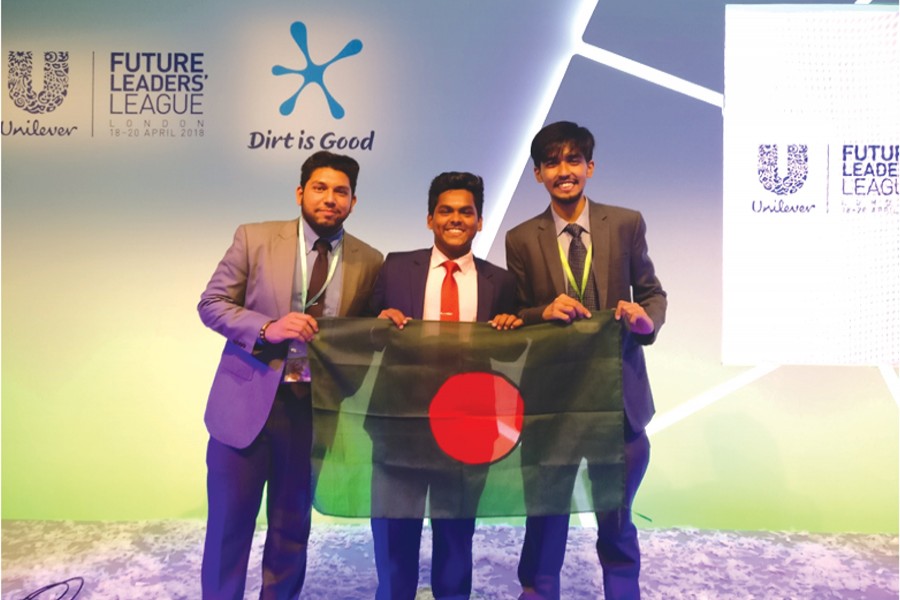Team Bangladesh, consisting of Mahbub Rahman Nafee, Afnan Bin Ashraf and Rafid-ur Rob, secured the first runner-up position at Unilever Future Leaders' League (FLL) 2018. After winning the national round of this competition, this team got the opportunity to represent Bangladesh in the global arena.
About Unilever FLL
Unilever Future Leaders' League is a dynamic marketing competition that brings together students from all over the world who want to experience what tomorrow's leadership is all about. The competition gives participants a chance to enroll in a creative brand challenge where they get the opportunity to work with real brands and real cases. Also, this allows the participants to understand Unilever from the inside, to hear from the top leaders who build and manage globally well-known brands and boost the skills one needs to become a future leader.
Teams represent their countries in this global platform after having won the national round in their respective countries, to fight it out for the prestigious championship and also earn an invitation to One Young World, a global forum that gathers young leaders from around the world to develop solutions to the world's most pressing issues.
Unilever FLL 2018
Twenty five teams, consisting of three people each, attended the global competition held in London, UK. These 25 teams came from over 54,000 participants from all over the globe. There were two presentation rounds, namely the semi-finals, and the finals, where the participants had to work on two different cases for each round. Both the cases were based on 'Dirt Is Good,' otherwise known as Surf Excel here in Bangladesh. The 25 teams competed in the first round, where they were required to try and find out a way to reduce plastic consumption as a brand. Following an intense round of competition, ten teams were selected for the final round.
The case for the grand finale was both challenging and exciting this year. It required the teams to create a disruptive business model through channel innovation to make 'Dirt Is good' relevant in the future. All the teams came up with their unique ideas and the judges provided detailed feedback to all the groups. After carefully analysing the solutions provided by the teams, the judges came up with the much-anticipated result. Team Serbia clinched the title of Unilever FLL 2018. Team Bangladesh and Team Middle Americas won the first and second runner-up position respectively.
Experiences of Team Bangladesh
The members of Team Bangladesh shared their experiences of the competition. All three of them graduated from the Institute of Business Administration, University of Dhaka earlier this year. Afnan Bin Ashraf discussed the differences between the national and global round. He said, "First, the local round had a greater number of rounds before the finals, compared to the global one, which just had the semi-finals. However, the global one was far more challenging and required much more research. The local round also focused on local standpoints and local brands, whereas the global one focused on a global brand and we made strategies that could be carried out globally." This indicates that the participants analysed their solutions from many different angles.
Ten teams made their way to the finale. The tension was building up when the judges walked in. However, to lighten the mood, Team Bangladesh was called up on stage for a small dance. Mahbub Rahman Nafee shared his thoughts about the grand finale. He said, "All the teams presented their brilliant ideas on stage, and it was fascinating to see how differently the teams thought. Some teams even brought prototypes of their ideas. The ideas presented explored all avenues, for today and the future. It was intriguing to see how participants gave much thought to technology and consumer trends, trying to support their ideas with the perfect blend. However, feasibility topped all criteria."
Unilever FLL 2018 was undoubtedly an enlightening and challenging event for all the participants. When asked about the major takeaways from this competition, Rafid-ur Rob said, "Firstly, it is not always the most interesting idea that wins, but the most feasible one. Secondly, global competitions bring diverse mindsets and henceforth very different ideas catered to the same problem. Therefore, the idea is to fall in love with the problem to find the most effective way to solve it."
The writer is a final year student of BBA programme at the Institute of Business Administration (IBA), University of Dhaka. He can be reached at [email protected]


